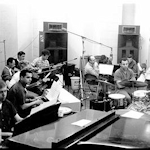The Swampers were a renowned group of session musicians based in Muscle Shoals, Alabama. They played a significant role in shaping the sound of American popular music during the 1960s and 1970s. The group initially formed as the rhythm section for FAME Studios, and later established their own studio, Muscle Shoals Sound Studio.
Origins: The "Muscle Shoals Rhythm Section" came together in the early 1960s when Rick Hall founded FAME Studios in Muscle Shoals. The original lineup consisted of Norbert Putnam on bass, David Briggs on keyboards and Jerry Carrigan on drums. They played on many recordings produced by Rick Hall.
The group would eventually be lured away by other recording studios in Nashville, Tennessee. Hall hired a replacement group comprised of Barry Beckett, Roger Hawkins, David Hood and Jimmy Johnson, initially called "the Second FAME Gang", but widely known by the nickname "The Swampers."
Move to Muscle Shoals Sound Studio: In 1969, the Swampers left FAME Studios due to a contract dispute and established their own recording studio called Muscle Shoals Sound. The new studio attracted a wide range of musicians from various genres who sought out the Swampers' unique sound and tight rhythm section.
Musical Style and Contributions: The Swampers were known for their distinct blend of R&B, soul, rock, and country music. Their ability to seamlessly switch between genres allowed them to work with a diverse range of artists. They had a reputation for providing solid grooves, tight rhythms, and tasteful musical embellishments that enhanced recordings.
Notable Collaborations: The Swampers worked with numerous legendary artists and bands, including Aretha Franklin, Wilson Pickett, Percy Sledge, The Staple Singers, Paul Simon, Bob Seger, Rod Stewart, The Rolling Stones, Lynyrd Skynyrd, Bob Dylan and many others. They contributed to hit songs like "Respect" by Aretha Franklin, "Brown Sugar" by The Rolling Stones, and "Kodachrome" by Paul Simon.
Fame and Recognition: The Swampers' reputation grew steadily over the years, and their contributions to popular music were highly regarded. They were mentioned by name in the lines "Now, Muscle Shoals has got The Swampers, And they've been known to pick a song or two" in the Lynyrd Skynyrd song "Sweet Home Alabama." Their work was featured in the 2013 documentary "Muscle Shoals," which further elevated their recognition.
Later Years and Legacy: Muscle Shoals Sound Studio moved to a new location in 1979, an abandoned former National Guard armory the city of Sheffield, Alabama offered them at an attractive price to dissuade a move to a competing town. The new studio also marked a move toward production and publishing rather than performing.
Muscle Shoals Sound Studio closed its doors in 1985, but the legacy of the Swampers continued to influence music. The original members pursued successful careers as session musicians, producers, and songwriters, individually contributing to the music industry. The original Muscle Shoals Sound Studio building was later reopened and continues to operate as a historic landmark.
The Swampers' contributions to popular music and their unique sound have left an indelible mark on the industry. Their ability to cross genres and enhance recordings with their exceptional musical talents solidifies their place in music history.

